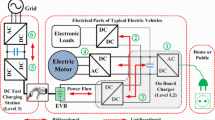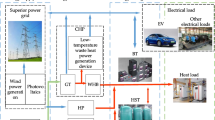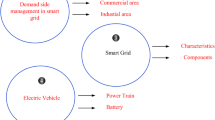Abstract
In order to reduce the air pollution by traditional fossil fuel and save the charging cost, much attention has been paid to the charging scheduling of electric vehicles (EVs) in the uncertain supplement of wind power and solar power. Owing to the randomness in the renewable power generation and the EV charging demand, simulation-based policy improvement (SBPI) has been well adopted for making charging decision. However, it is challenging to explore the large action space which grows exponentially with respect to the system scale. We consider this important problem in this paper and make the following contributions. First, we explore the structural property of the problem and develop an urgency index to rank the EVs. Second, we apply three methods to search in the action space. Third, we numerically demonstrate the performance of the urgency index and the search methods, and compare the SBPI methods with the CPLEX-based method. It shows that SBPI improves the base policies in all these cases.
Similar content being viewed by others
References
Wang H W, Zhang X B, Ouyang M G. Energy and environmental life-cycle assessment of passenger car electrification based on Beijing driving patterns. Sci China Technol Sci, 2015, 58: 659–668
Mohammadi K, Alavi O, Mostafaeipour A, et al. Assessing different parameters estimation methods of Weibull distribution to compute wind power density. Energy Convers Manage, 2016, 108: 322–335
Murata A, Ohtake H, Oozeki T. Modeling of uncertainty of solar irradiance forecasts on numerical weather predictions with the estimation of multiple confidence intervals. Renew Energy, 2018, 117: 193–201
Amjad M, Ahmad A, Rehmani M H, et al. A review of EVs charging: from the perspective of energy optimization, optimization approaches, and charging techniques. Transpation Res Part D-Transp Environ, 2018, 62: 386–417
Nimalsiri N I, Mediwaththe C P, Ratnam E L, et al. A survey of algorithms for distributed charging control of electric vehicles in smart grid. IEEE Trans Intell Transp Syst, 2020, 21: 4497–4515
Jia Q S, Shen J X, Xu Z B, et al. Simulation-based policy improvement for energy management in commercial office buildings. IEEE Trans Smart Grid, 2012, 3: 2211–2223
Xu Y, Pan F, Tong L. Dynamic scheduling for charging electric vehicles: a priority rule. IEEE Trans Automat Contr, 2016, 61: 4094–4099
Hu J Q, Fu M C, Marcus S I. A model reference adaptive search method for global optimization. Operations Res, 2007, 55: 549–568
Hu J Q, Fu M C, Marcus S I. A model reference adaptive search method for stochastic global optimization. Commun Inf Syst, 2008, 8: 245–276
Hu J Q, Hu P, Chang H S. A stochastic approximation framework for a class of randomized optimization algorithms. IEEE Trans Automat Contr, 2012, 57: 165–178
Hong L J, Nelson B L. Discrete optimization via simulation using COMPASS. Operations Res, 2006, 54: 115–129
Yan Q, Zhang B, Kezunovic M. Optimized operational cost reduction for an EV charging station integrated with battery energy storage and PV generation. IEEE Trans Smart Grid, 2019, 10: 2096–2106
Zhong Q W, Buckley S, Vassallo A, et al. Energy cost minimization through optimization of EV, home and workplace battery storage. Sci China Technol Sci, 2018, 61: 761–773
Zhang Y M, Wei Z, Li H, et al. Optimal charging scheduling for catenary-free trams in public transportation systems. IEEE Trans Smart Grid, 2019, 10: 227–237
Eldeeb H H, Faddel S, Mohammed O A. Multi-objective optimization technique for the operation of grid tied PV powered EV charging station. Electric Power Syst Res, 2018, 164: 201–211
Zhang Y M, Cai L. Dynamic charging scheduling for EV parking lots with photovoltaic power system. IEEE Access, 2018, 6: 56995–57005
Jia Q S, Wu J. On distributed event-based optimization for shared economy in cyber-physical energy systems. Sci China Inf Sci, 2018, 61: 110203
Xie S, Zhong W, Xie K, et al. Fair energy scheduling for vehicle-to-grid networks using adaptive dynamic programming. IEEE Trans Neural Netw Learn Syst, 2016, 27: 1697–1707
Wu Y, Ravey A, Chrenko D, et al. Demand side energy management of EV charging stations by approximate dynamic programming. Energy Convers Manage, 2019, 196: 878–890
Zhang Y M, You P C, Cai L. Optimal charging scheduling by pricing for EV charging station with dual charging modes. IEEE Trans Intell Transp Syst, 2019, 20: 3386–3396
Huang Q, Jia Q S, Guan X. A multi-timescale and bilevel coordination approach for matching uncertain wind supply with EV charging demand. IEEE Trans Automat Sci Eng, 2017, 14: 694–704
Puterman M, Puterman M L. Markov Decision Processes: Discrete Stochastic Dynamic Programming. Hoboken: John Wiley & Sons, 2014
Hastings W K. Monte Carlo sampling methods using Markov chains and their applications. Biometrika, 1970, 57: 97–109
Leterme W, Ruelens F, Claessens B, et al. A flexible stochastic optimization method for wind power balancing with PHEVs. IEEE Trans Smart Grid, 2014, 5: 1238–1245
Wang Z, Jochem P, Fichtner W. A scenario-based stochastic optimization model for charging scheduling of electric vehicles under uncertainties of vehicle availability and charging demand. J Cleaner Production, 2020, 254: 119886
Lopez K L, Gagne C, Gardner M A. Demand-side management using deep learning for smart charging of electric vehicles. IEEE Trans Smart Grid, 2019, 10: 2683–2691
Wan Z, Li H, He H, et al. Model-free real-time EV charging scheduling based on deep reinforcement learning. IEEE Trans Smart Grid, 2019, 10: 5246–5257
Qian T, Shao C, Wang X, et al. Deep reinforcement learning for EV charging navigation by coordinating smart grid and intelligent transportation system. IEEE Trans Smart Grid, 2020, 11: 1714–1723
Yang Y, Jia Q S, Deconinck G, et al. Distributed coordination of EV charging with renewable energy in a microgrid of buildings. IEEE Trans Smart Grid, 2018, 9: 6253–6264
Chang H S, Hu J, Fu M C, et al. Simulation-based Algorithms for Markov Decision Processes. London: Springer, 2013
Sedighizadeh M, Mohammadpour A, Alavi S M M. A daytime optimal stochastic energy management for EV commercial parking lots by using approximate dynamic programming and hybrid big bang big crunch algorithm. Sustain Cities Soc, 2019, 45: 486–498
Tushar M H K, Assi C, Maier M, et al. Smart microgrids: optimal joint scheduling for electric vehicles and home appliances. IEEE Trans Smart Grid, 2014, 5: 239–250
Blanco M I. The economics of wind energy. Renew Sustain Energy Rev, 2009, 13: 1372–1382
Branker K, Pathak M J M, Pearce J M. A review of solar photovoltaic levelized cost of electricity. Renew Sustain Energy Rev, 2011, 15: 4470–4482
Grogg K. Harvesting the wind: the physics of wind turbines. Physics and Astronomy Comps Papers. Northfield: Carleton College, 2005
Ishaque K, Salam Z, Syafaruddin Z. A comprehensive MATLAB simulink PV system simulator with partial shading capability based on two-diode model. Sol Energy, 2011, 85: 2217–2227
Shahidinejad S, Bibeau E, Filizadeh S. Statistical development of a duty cycle for plug-in vehicles in a north american urban setting using fleet information. IEEE Trans Veh Technol, 2010, 59: 3710–3719
Bertsekas D P, Castanon D A. Rollout algorithms for stochastic scheduling problems. J Heuristics, 1999, 5: 89–108
Huang Q, Jia Q S, Qiu Z, et al. Matching EV charging load with uncertain wind: a simulation-based policy improvement approach. IEEE Trans Smart Grid, 2015, 6: 1425–1433
Lee T K, Bareket Z, Gordon T, et al. Stochastic modeling for studies of real-world PHEV usage: driving schedule and daily temporal distributions. IEEE Trans Veh Technol, 2012, 61: 1493–1502
Acknowledgements
This work was supported in part by National Key Research and Development Program of China (Grant No. 2016YFB0901900), National Natural Science Foundation of China (Grant No. 61673229), and the 111 International Collaboration Project of China (Grant No. BP2018006).
Author information
Authors and Affiliations
Corresponding author
Rights and permissions
About this article
Cite this article
Jiang, Z., Jia, QS. & Guan, X. On large action space in EV charging scheduling optimization. Sci. China Inf. Sci. 65, 122201 (2022). https://doi.org/10.1007/s11432-020-3106-7
Received:
Revised:
Accepted:
Published:
DOI: https://doi.org/10.1007/s11432-020-3106-7




